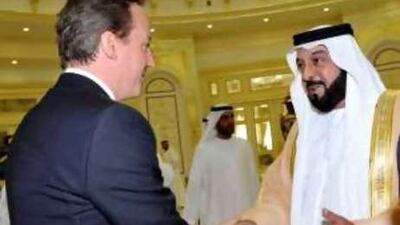LONDON // A joint UK-UAE diplomatic taskforce has been established in the first move by the new British government to forge stronger ties with the world's emerging economic superpowers. At a speech at the Foreign Office in London, William Hague, the foreign secretary in the seven-week-old Conservative-led coalition government, accused the previous Labour government of ignoring the importance of such links.
The prime minister, David Cameron, launched the taskforce with the UAE as part of UK "efforts to elevate links with the Gulf", Mr Hague said. "It will develop options for strengthening our ties across the board." The taskforce met for the first time yesterday. Mr Hague said the new administration would seek to establish similar initiatives with India, Latin America, South East Asia and China. A decline in the UK's market share in trade with the UAE was a reflection of the country's softening in trade policy over the past decade, Mr Cameron said yesterday.
"I do sometimes sense when I look at how we deal with international relations in terms of trade and trade promotion that we are playing softball while the rest of the world is playing hardball," said Mr Cameron, in a speech to The Times CEO Summit in London. The UAE is the UK's 13th largest export market, with bilateral trade worth about £7.5 billion (Dh41bn) every year. Yet, Mr Cameron expressed disappointment at the UK's trade performance with the UAE. "A decade ago, we had eight per cent of [the UAE's] market, the same as China. Today, 10 years later, we have four per cent, and China has 16 per cent," he said.
"If you take just that one example of a high-growth economy where Britain has got a fantastic set of relationships, historical connections, great coordination between governments, armed forces, a huge amount of exchange of people, and yet our performance is like that." The UAE's importance was highlighted last month when Mr Cameron, making his first overseas trip since assuming office, insisted on a stopover to meet with UAE leaders as he flew back from visiting British troops stationed in Afghanistan. Mr Cameron met Sheikh Khalifa bin Zayed, President of the UAE and Ruler of Abu Dhabi, on that visit, and the initiative was followed up during a recent trip to London by Sheikh Abdullah bin Zayed, the Foreign Minister.
The two countries' foreign ministers will oversee the taskforce, which will focus on strengthening ties in a broad spectrum of areas including trade, commerce, defence and education. In an interview this week the new British ambassador to the UAE, Dominic Jermey, said his government was keen to boost relations that have not been maximised in recent years. Yesterday's initial taskforce meeting in London was attended by Dr Anwar Gargash, Minister of State for Foreign Affairs, Alistair Burt, the parliamentary under secretary of state at the foreign office and Mr Jermey. A further ministerial meeting is expected after Ramadan and will be held about every six months. "Our countries enjoy close historical ties, we share many common interests, and we already cooperate closely on political, economic and security issues," said Ian Wood, chargé d'affaires at the British Embassy in Abu Dhabi. "But we are keen to explore how we can broaden and deepen that cooperation even further." The renewed diplomatic and trade policy is part of a larger reappraisal of UK foreign policy. Outlining in his speech why he believed such a reappraisal was necessary, Mr Hague embraced a change of approach that many of the country's diplomats had been advocating for years. "Put simply, the world has changed and if we do not change with it, Britain's role is set to decline with all that that means for our influence in world affairs, our national security and our economy. "Achieving our foreign policy objectives has become harder and will become more so unless we are prepared to act differently." While Mr Hague said the UK's links with the US would remain strong, he signalled a more independent approach when he emphasised "other bilateral ties matter, too, whether they are long-standing ties which have been allowed to wither or stagnate or the new relations that we believe we must seek to forge for the 21st century. "Regional groups are certainly strengthening across the world, but these groups are not rigid or immutable. Nor have they diminished the role of individual states as some predicted. "Today, influence increasingly lies with networks of states with fluid and dynamic patterns of allegiance, alliance and connections, including the informal, which act as vital channels of influence and decision-making and require new forms of engagement from Britain." Despite the UK's having historic links with India, the country had slid from being the fourth largest exporter to India to the 18th, Mr Cameron said in the speech on Monday. With the UK beginning to grow out of the bottom of an economic cycle, there was an opportunity for the government to refocus the country's trade and diplomatic efforts towards closer links with the Gulf countries and South East Asia, Mr Cameron said. UK and UAE officials agreed in October to boost trade by 60 per cent by 2015 to £12bn. @EMail:dsapsted@thenational.ae * With additional reporting by Loveday Morris, Tom Arnold and Ivan Gale in Abu Dhabi

